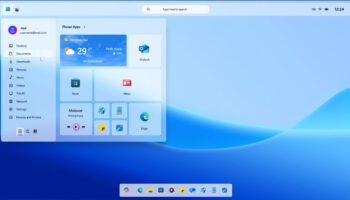Phishing and deepfakes are leading AI-powered threats

A new survey of cybersecurity professionals finds that 75 percent of respondents think phishing attacks pose the greatest AI-powered threat to their organization, while 56 percent say deepfake enhanced fraud (voice or video) poses the greatest threat.
The study from Team 8, carried out at its annual CISO Summit, also finds that lack of expertise (58 percent) and balancing security with usability (56 percent) are the two main challenges organizations face when defending AI systems.
AI for social good: Highlighting positive applications of AI in addressing social challenges -- along with the potential pitfalls to avoid

Depending on who you ask, artificial intelligence could be the future of work or the harbinger of doom. The reality of AI technology falls somewhere between these two extremes. Although there are certainly some use cases of AI technology that could be harmful to society, others have seen the technology substantially improve their productivity and efficiency.
However, artificial intelligence has even more significant implications than improving the productivity of workers and businesses. Some use cases of AI have been proposed that could have profound social implications and address social challenges that are becoming more pressing today.
Save $36.99! Get 'Starting an Online Business: All-In-One For Dummies, 6th edition' for FREE

With the right knowledge and resources, you can take action to start the online business you’ve been dreaming of. This comprehensive guide provides tips and tricks for turning your dream into a reality.
The sixth edition of Starting an Online Business: All-in-One For Dummies will teach you the basics and beyond. It will prepare you to set up your business website, offer your products in an online store, and keep accurate books. The authors help you navigate the primary legal, accounting, and security challenges related to running an online business.
Forget Windows 11 -- Windows Moon Valley reaches a major milestone, download it now!

Windows 11, much like its predecessor Windows 10, has been criticized for various design inconsistencies. From outdated interface elements to uneven system-wide aesthetics, these issues have led to the development of tools like Rectify11, which streamline and improve the visual design of the operating system.
Windows Moon Valley takes this a step further by addressing not only Windows’ design shortcomings but also enhancing its overall functionality. The project is essentially a cross between Windows 10X (a streamlined version of Windows 10 originally designed for dual-screen and foldable devices, later adapted for single-screen devices) and Windows 11.
Passwords still rule when securing user accounts

A new global study reveals that 58 percent of people use a username and password to login to personal accounts and 54 percent do so to login to work accounts.
The report from Yubico, based on a study of 20,000 people around the world carried out by Talker Research, reveals a worrying lack of awareness of best practices for authentication. 39 percent think username and password are the most secure and 37 percent think mobile SMS based authentication is the most secure, though both are highly susceptible to phishing attacks.
Kaspersky users in the US find themselves forcibly migrated to the mysterious UltraAV

It is not unusual for software to update itself without user interaction; when it comes to delivering security patches and new features this is entirely desirable. But to have an app uninstall itself and replace itself with a different product? That’s not only highly unusually, it’s also worrying.
And yet this is what is happening for users of Kaspersky antivirus software in the US. Having been deemed a threat to national security, the sale of software from the Russian cybersecurity firm Kaspersky was banned in the US. Having promised that its customers would be taken care of, Kaspersky is now keeping its promise but forcibly replacing its security software with the largely unknown UltraAV on US customers’ computers
Samsung introduces PCIe 4.0 automotive SSD with eighth-generation V-NAND

Samsung Electronics has revealed its development of the first PCIe 4.0 automotive SSD built on eighth-generation vertical NAND (V-NAND). The new SSD, AM9C1, is designed to provide enhanced speed and reliability for automotive applications, particularly supporting on-device AI capabilities.
The AM9C1 SSD reportedly offers a 50 percent improvement in power efficiency compared to the previous model, the AM991, with sequential read speeds reaching 4,400MB/s and write speeds up to 400MB/s. This is intended to improve the handling of large amounts of data in vehicles, particularly for autonomous systems.
Elon Musk risks privacy backlash by permitting accounts you’ve blocked on X to see your posts

If you’ve decided to stick with X after Elon Musk took over Twitter and started to systematically destroy anything good that was left there (which, admittedly was not much) you’ve probably made extensive use of the Block function to filter out some of the crap that flows through the social media sewer. Now the value of blocking is about to be diminished.
Musk has confirmed that the functionality of the block button is changing. The change means that while an account you have blocked will not be able to interact with you or your posts, they will be able to see any posts that you’ve written. It’s an idea that has already been met with criticism, with many voicing concerns about privacy implications.
Transcend introduces MTE730P industrial-grade PCIe M.2 22110 SSD

Transcend has unveiled its first industrial-grade PCIe M.2 22110 SSD, the MTE730P, designed for a range of industrial environments. The SSD includes Power Loss Protection (PLP) technology, which maintains data integrity during power fluctuations. With PCIe Gen 4 support and capacities up to 4TB, the MTE730P is suited for use in automation, data centers, blade servers, and other modern storage needs.
The SSD delivers sequential read and write speeds of up to 7,500MB/s and 6,700MB/s, respectively, thanks to 112-layer 3D NAND flash and an 8-channel controller. It also features components such as 30µ” PCB gold finger, Corner Bond, and anti-sulfur resistors for durability. The MTE730P is built to operate in temperatures ranging from -40°C to 85°C, ensuring performance in harsh conditions.
Social media could be good for your mental health

It's a pretty fair bet that if you asked most people they would skeptical about the effects of social media on well-being. However, new research from the Saïd Business School at the University of Oxford suggests there are positive benefits of social media usage on adults' mental health.
Academics conducted a six-month study of 1029 adults, with participants' daily time using social platforms on their Android mobile device unobtrusively tracked and their well-being measured every two weeks.
Cloudflare introduces AI Audit to help websites manage AI access and content usage

Cloudflare has introduced AI Audit, a new set of tools aimed at helping websites manage how artificial intelligence (AI) models access and use their content. AI Audit allows content creators to see how their content is being used by AI models and take steps to control access. Additionally, Cloudflare is working on a pricing feature that will enable creators to set a price for AI companies using their content for model training and retrieval augmented generation (RAG).
Many website owners may not be aware that AI bots are scanning their content frequently, often without the creator’s knowledge or compensation. AI Audit is designed to give control back to content owners, allowing them to block AI bots, access analytics on content usage, and negotiate agreements for the use of their content by AI models.
Dark web exposure increases risk of attack

The presence of any data relating to an organization on the dark web demonstrably increases its risk of a cyberattack.
This probably won't come as too much of a surprise but it's confirmed by new research from Searchlight Cyber, the dark web intelligence company, and the Marsh McLennan Cyber Risk Intelligence Center.
New ethical hacking qualification aims to deliver skills to tackle cybercrime

A new qualification aims to equip cybersecurity professionals with the skills needed to tackle cybercrime in the age of AI.
Certified Ethical Hacker CEH v13 from EC-Council, a leader in cybersecurity certification, education, and training, provides in-depth training by integrating AI into all five phases of ethical hacking, from reconnaissance and scanning to gaining access, maintaining access, and covering tracks.
Tackling the business threat posed by deepfakes [Q&A]

AI has become an undeniable and powerful part of the digital landscape. It makes systems stronger and more automated -- but it also has the potential to present a threat.
Some 80 percent of executives believe deepfakes pose a risk to their business, yet only 29 percent say they have taken steps to combat them. We spoke to Patrick Harding, chief product architect at Ping Identity, to discuss the security threats posed by AI and the need to take steps to properly secure identity by adding additional layers of protection.
Plugable launches 15.6-inch USB-C Portable Display (USBC-PDMON) with integrated hub

Plugable has launched its first-ever portable monitor, the 15.6-inch USB-C Portable Display (USBC-PDMON). This display boasts a 1920x1080 Full HD IPS panel with a 60Hz refresh rate. It features integrated folding cover and stand, 85W pass-through charging, and two downstream 10Gbps USB-C ports for added versatility.
According to Plugable's CTO, Bernie Thompson, "We've created a portable display that is more powerful, flexible, and useful by getting rid of confusing legacy connectors and adapters and making the most of USB-C. IT managers and buyers can deploy this same portable monitor at scale in the office, for their hybrid and mobile staff, and in public spaces and trade shows."
Most Commented Stories
© 1998-2024 BetaNews, Inc. All Rights Reserved. Privacy Policy - Cookie Policy.




